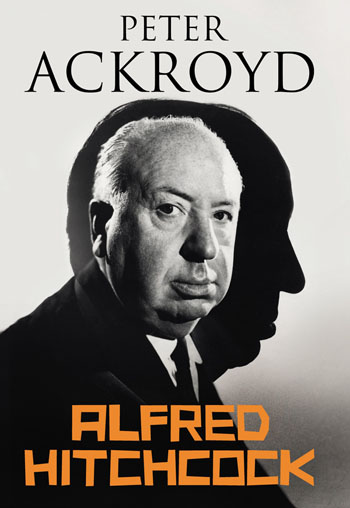“Peter Ackroyd might be one of the few working biographers worthy of his own biography,” begins Peter Murphy in the Irish Times. “Since the 1980s he has published more than 50 books of poetry, fiction and the biographical works for which he’s become acclaimed, including exhaustive studies of Eliot, Pound, Blake, Dickens and others…. Alfred Hitchcock is the latest installment in Ackroyd’s ongoing Brief Lives series. (Previous subjects include Chaucer, Turner, Newton, Poe and Chaplin.) He’s probably written footnotes longer than this book; at 250 pages odd it’s a mere pamphlet compared with Bible-sized behemoths such as London: The Biography or Thames: Sacred River. In that light, Alfred Hitchcock seems less like a labor of obsessive love than a pleasurable dalliance.”
In the Telegraph, Duncan White suggests that “if there is any writer capable of imaginative sympathy with Hitchcock, it is Ackroyd. Both were brought up in strict Catholic households in lower-middle-class London and both were boys in whom there was a contradictory mix of shyness and ambition. Both developed an insatiable appetite for work. Both publicly declared themselves celibate. Hitchcock made some of his finest films late in his life; Ackroyd, at 65, seems to be gaining momentum.”
“For film fanatics, Ackroyd’s slim volume will offer no replacement for the more comprehensive treatment by Patrick McGilligan (Alfred Hitchcock: A Life in Darkness and Light),” grants Bee Wilson in the Guardian. “Yet Ackroyd’s deft and moving biography proves that there is a fresh story to be told, and that he is the person to do it. Hitchcock grew up in a London that was recognizably still the city of Dickens. The director’s ability to mix ‘threat with pantomime’ was a ‘cockney vision,’ says Ackroyd. His imagination, too, was similar to that of Dickens. ‘They were both fantasists who insisted upon meticulous detail in the unravelling of their plots; they were both poised between art and commerce, with a keen taste for the making of money.'”
“How did [London] stir Hitchcock’s imagination?” asks John Walsh. “‘It’s a sort of cockney vision,’ Ackroyd says, ‘that goes way back, past Shakespeare, and is about the conflation of irreconcilable things: pantomime and tragedy, horror and farce. They’re right there in both Chaplin and Hitchcock, especially the latter—you never know whether to laugh or scream in his films.'” Also in the Independent, Louise Jury finds that “while no life of Hitchcock can be entirely dull, it is hard not to conclude that Ackroyd on Hitchcock was something of a quick-fire exercise in précis.”
In the Financial Times, Ian Thomson notes that “Ackroyd highlights Hitchcock’s Jesuitical secondary school education at St. Ignatius College in north London. From the Jesuits Hitchcock believed he learnt the virtues of order, control and precision as well as, no doubt, a strong sense of fear…. For all its insight, Peter Ackroyd’s biography is a deft synthesis of numerous other studies of ‘Alfred the Great’; it is well written, however, and unusually well attuned to the religious element.”
Related: Anne Thompson and her team rank Hitchcock’s “Top 25” films.
Update, 4/13: For the Observer, Peter Conrad reviews both Ackroyd’s book and Michael Wood’s Alfred Hitchcock: The Man Who Knew Too Much: “Ackroyd sees him as a case for Freudian treatment, who assumed that his neuroses were universal…. For Michael Wood, the films disseminate an unease that is psychological rather than theological. Hitchcock, Wood says, exploits ‘registers of speculation’ that taint his fortuitous happy endings.”
Update, 4/25: “Of the several-hundred volumes on Hitchcock published over the past half-century,” writes Leo Robson in the New Statesman, “the majority divide into acts of critical exegesis indifferent to his public persona or even his private self and brisk, myth-laden biography in which Hitchcock emerges as a superb technician, the man who invented the inverse zoom, who got Detective Arbogast to fall backwards so brilliantly down Mrs. Bates’s staircase.” Ackroyd “comfortably to the second camp.” As for Michael Wood:
Readers of the LRB and the NYRB, for which he has written a combined total of about 400 articles, do not rush to his work for calm synopsis but a kind of critical drunkenness—high-spirited, infectiously giddy, sometimes wayward. When Ackroyd gets to Vertigo, he tells us all about the production before praising, or volubly defining, the result: “a meditation on fate itself… a film of coincidence and double identity, of fatality and suspense… an exercise in nostalgia as well as obsession… a reverie and a lament, a threnody and a hymn.” Wood, mostly diligent at providing the facts, dives straight in and asks a central question: why would the “very good” novel on which Vertigo is based “never be taken for a great work of fiction,” while Vertigo is “thought to be a great movie”? It leads to the best ten pages in the book.
For news and tips throughout the day every day, follow @KeyframeDaily. Get Keyframe Daily in your inbox by signing in at fandor.com/daily.




